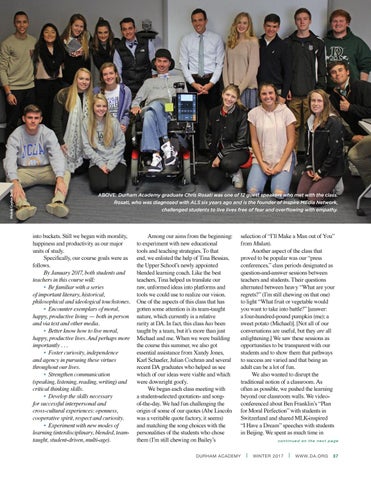Melody Guyton Butts
ABOVE: Durham Academy graduate Chris Rosati was one of 12 guest speakers who met with the class. Rosati, who was diagnosed with ALS six years ago and is the founder of Inspire MEdia Network, challenged students to live lives free of fear and overflowing with empathy.
into buckets. Still we began with morality, happiness and productivity as our major units of study. Specifically, our course goals were as follows. By January 2017, both students and teachers in this course will: • Be familiar with a series of important literary, historical, philosophical and ideological touchstones. • Encounter exemplars of moral, happy, productive living — both in person and via text and other media. • Better know how to live moral, happy, productive lives. And perhaps more importantly . . . • Foster curiosity, independence and agency in pursuing these virtues throughout our lives. • Strengthen communication (speaking, listening, reading, writing) and critical thinking skills. • Develop the skills necessary for successful interpersonal and cross-cultural experiences: openness, cooperative spirit, respect and curiosity. • Experiment with new modes of learning (interdisciplinary, blended, teamtaught, student-driven, multi-age).
Among our aims from the beginning: to experiment with new educational tools and teaching strategies. To that end, we enlisted the help of Tina Bessias, the Upper School’s newly appointed blended learning coach. Like the best teachers, Tina helped us translate our raw, unformed ideas into platforms and tools we could use to realize our vision. One of the aspects of this class that has gotten some attention is its team-taught nature, which currently is a relative rarity at DA. In fact, this class has been taught by a team, but it’s more than just Michael and me. When we were building the course this summer, we also got essential assistance from Xandy Jones, Karl Schaefer, Julian Cochran and several recent DA graduates who helped us see which of our ideas were viable and which were downright goofy. We began each class meeting with a student-selected quotation- and songof-the-day. We had fun challenging the origin of some of our quotes (Abe Lincoln was a veritable quote factory, it seems) and matching the song choices with the personalities of the students who chose them (I’m still chewing on Bailey’s DURHAM ACADEMY
selection of “I’ll Make a Man out of You” from Mulan). Another aspect of the class that proved to be popular was our “press conferences,” class periods designated as question-and-answer sessions between teachers and students. Their questions alternated between heavy “What are your regrets?” (I’m still chewing on that one) to light “What fruit or vegetable would you want to take into battle?” [answer: a four-hundred-pound pumpkin (me); a sweet potato (Michael)]. [Not all of our conversations are useful, but they are all enlightening.] We saw these sessions as opportunities to be transparent with our students and to show them that pathways to success are varied and that being an adult can be a lot of fun. We also wanted to disrupt the traditional notion of a classroom. As often as possible, we pushed the learning beyond our classroom walls. We videoconferenced about Ben Franklin’s “Plan for Moral Perfection” with students in Switzerland and shared MLK-inspired “I Have a Dream” speeches with students in Beijing. We spent as much time in continued on the next page
|
WI NTER 2017
|
WWW.D A .OR G
37
